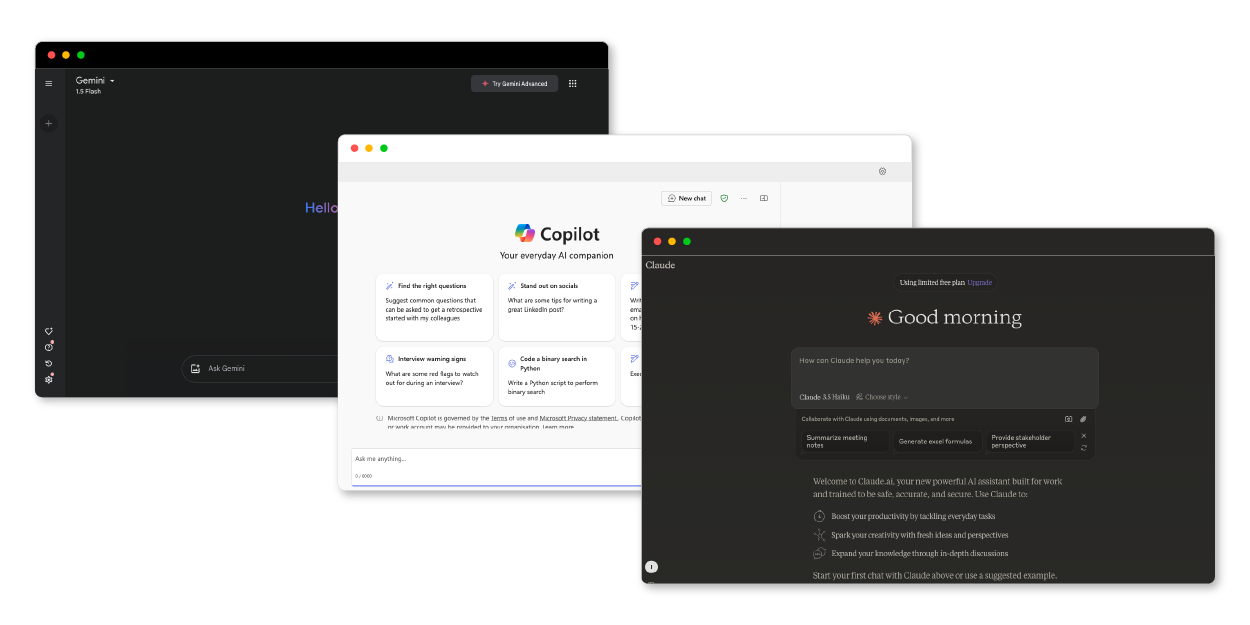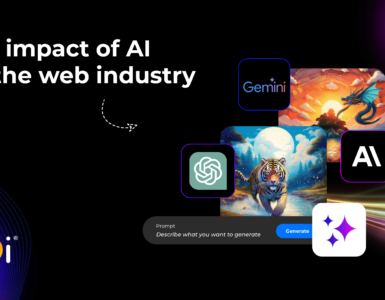We surveyed digital professionals and asked if/how they use AI, and how AI is affecting their industry. Copywriters, Digital Marketers, Web Designers and Web Developers shared their experiences, and we found some eye-opening trends.
This article focuses on the feedback given by professionals who use AI in their copywriting work, and is drawn from our AI Survey.
If you’re looking for tips on how to use AI to write copy then this guide will get you started.
Who are the Copywriters we surveyed?
This is how long our respondents have been in their roles:
0-2 years: 21%
3-5 years: 30%
6-9 years: 6%
10+ years: 43%
With so much collective experience: our respondents know what they’re talking/writing about, and what to look for when it comes to crafting high quality copy.
18% of our copywriters are business owners/employers. 9% are freelancers and 73% are employees.
How do they navigate the uncertain seas of AI produced content and reach their goal of making excellent, compelling website content and marketing materials for their clients when their livelihoods depend on their success?
The problem with using AI tools
More people having access to powerful creative tools is a clear net positive. Anyone with internet access can almost instantly generate endless paragraphs of text, images and even code for use on their websites and, aside from using a template, there is no quicker way to get up and running.

We’re not at the stage where AI is the solution to everything: AI powered web builders cause as many problems as they solve, and getting LLMs to churn out decent copy is a roll of the dice – even if your prompts are concise.
Google and other search engines exist to make sure we get what we need. This strongly incentivises them to put a lot of time into excluding ‘low quality AI generated content’ from SERPs.
If using AI to make content for your website can have a strong, negative impact then why do 54% of professional copywriters rely on these tools each month?
How often do professional Copywriters use AI tools?
- Never: 21%
- Monthly: 9%
- Weekly: 48%
- Daily: 21%
Did you expect to see that, in 2024, a fifth of copywriters don’t use AI tools?
Time in the role has a slight upward trend within the AI-avoidant portion of our respondents:
- 0-2 years: 12%
- 3-5 years: 29%
- 6-9 years: 17%
- 10+ years: 42%
All the information gathered was self-submitted by our respondents and was anonymous: there was no reason to lie.
For those that do use AI tools – what is it that keeps them coming back so frequently?
What Copywriters think of the results AI tools produce
Respondents reported a positive reaction to results they received from AI tools:
- Extremely impressed: 31%
- Somewhat impressed: 54%
- Neither impressed or unimpressed: 11%
- Somewhat unimpressed: 4%
- Extremely unimpressed: 0%
As an AI user: were you shocked to see 0% in the ‘extremely unimpressed’ category and just 4% ‘somewhat unimpressed’ given the results that you’ve seen these tools produce?
I’m not surprised that such a high number of people are using AI as part of their weekly work. As a writer, ChatGPT in particular has been really useful when I have writers block.
Rae Morey
Publisher @ The Repository
What do professional Copywriters use AI tools for?
- Image creation: 19%
- Project management: 23%
- Reporting & data analysis: 23%
- Design automation: 23%
- Social media posting: 38%
- Copywriting: 54%
- Generating ideas: 69%
Did you expect to see so much AI usage outside of ‘Copywriting’ and ‘Generating ideas’? High satisfaction with results coupled with the use of these tools outside of the immediate remit of the role suggests a high level of skill in AI use among copywriters.
This makes sense as the proficiency you develop with the written word translates into being able to write clear and detailed prompts.
What is the net result for the quality of content AI tools are empowering us to generate?
The impact AI has had on the quality of Copywriting
We asked our respondents “In the past 12 months, have you noticed AI impact the quality of work within your field?” to which they responded:
- AI has significantly improved the content quality: 18%
- AI has had a minor positive impact on content quality: 48%
- AI has had no impact on content quality: 9%
- AI has had a minor negative impact on content quality: 9%
- AI has significantly decreased content quality: 15%
Professional copywriters know and recognise quality content when they see it. With a discerning eye for detail: 2/3rds of copywriters feel that AI has made things better.
Even with these promising results – the impact of AI across the industry is not entirely positive.
Concerns Copywriters have about the impact of AI in their field
Our copywriters’ perturbations about the future of the field:
- No concerns: 3%
- Lack of creativity in AI-generated content: 52%
- Job displacement: 55%
- Over-reliance on AI: 58%
- Ethical misuse of AI: 64%
We already recognise AI-generated images, even when they have the correct number of fingers. AI-generated copy has its telltale signs too.
Producing content by entering prompts into an algorithm definitionally takes very little creativity compared to painting the ceiling of the Sistine Chapel, and if everyone is using the same tools there will logically be a homogenising of output.
This ties in with the over-reliance that copywriters also foresee as an issue.
When it comes to job displacement, our respondents were asked which of the following statements they agreed with most strongly:
- AI will create more jobs than it takes away: 30%
- AI will have no impact on jobs in the industry: 18%
- AI will take away more jobs than it creates: 52%
We’ve seen automation displace people in many industries. Is it now the time digital creatives face the same fate? If a LLM can do your job more efficiently in terms of running costs or volume of output then you, a human, is an unviable economic component.
Although respondents have the job title ‘Copywriter’ and not ‘Prophet’, their responses come from an informed place as they are more expert in their industry and the associated job market than the rest of us. It will be interesting to revisit this page in 5 years, 10 years and further into the future.
Ethical misuse being a higher concern than job displacement is an interesting trend. Indistinguishable deep-fakes and false information can have disastrous consequences for communities and nations – having reservations about AI tools being in the hands of ‘bad actors’ is not unreasonable.
Copywriters on the regulation of AI
Given the concerns about the ethical misuse of AI, it is unsurprising to see that our Copywriters expressed support for some degree of regulation:
- AI should not be regulated: 0%
- Don’t know/no opinion: 12%
- There should be some regulation: 58%
- AI should be heavily regulated: 30%
The sentiment is skewed towards regulated AI being a net positive – so what does a well-regulated future look like, and how will it improve things for Copywriters?
Areas of a Copywriter’s workflow that can be improved through AI
Asking “What areas within your workflow hold the most potential for improvement through AI?” saw the following responses:
- Image creation: 21%
- Design automation: 24%
- Code generation: 30%
- Reporting & data analysis: 30%
- Copywriting: 33%
- Social media posting: 33%
- Project management: 36%
- Generating ideas: 55%
The main takeaway is that only 1 in 3 Copywriters feel that AI has the potential to improve their workflow… in copywriting!
Here is some valuable insight into why this particular response was given:
As a professional association devoted to supporting copywriters, we’ve seen a great deal of concern from our members about the rise of generative AI tools.
We’re already hearing of clients prioritising cost over quality and relying on AI to generate copy for content marketing.
Brands with limited budgets may be satisfied with AI content, but those words are unlikely to make an impact with customers or win awards.
Human copywriters continue to be in demand because AI can’t replace human creativity, insight, or personality.
Leif Kendall
Director @ Pro Copywriters
Final thoughts
AI can’t replace human creativity, insight, or personality. Leif is absolutely right. For now.
As AI is fed more data, it will be able to perform increasingly more convincing impressions of humans. The point at which Turing Tests are flawlessly passed, perfect copy is produced and inspiring works of art are generated is surely near.
But is the age of Copywriters, authors almost over?
No: because ALDI and Marks and Spencer both exist. As do Rolls Royce and Fiat. Or fast food and organic produce. “The desire for unique consumer products” means that there will always be a market for quality, human writing.
So let’s be careful how much of ChatGPT’s draft we keep in our final edit!
If you’d like to stop your online content from being used by AI companies then follow these steps.








Add comment